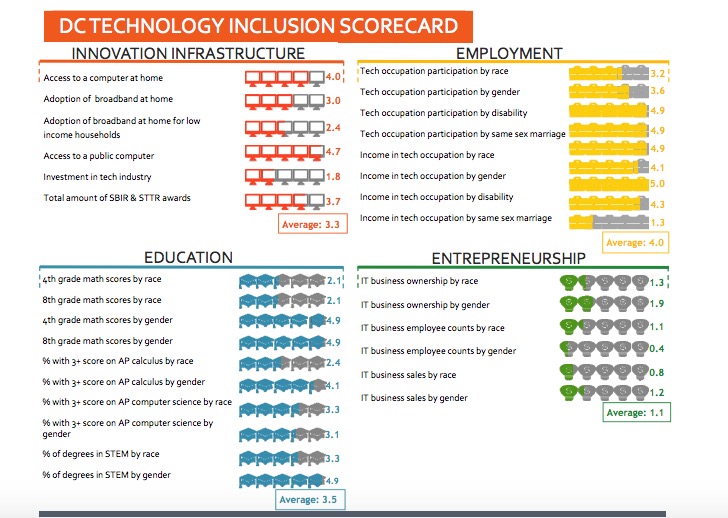Why start your tech company in D.C.?
Silicon Valley has the big names, the big successes, and Boston and New York both have more venture funding. What does D.C. have? It’s a question that comes back again and again within #dctech, and there are a variety of potential answers.
For example, there’s the one most closely espoused by 15th Street’s 1776 — D.C. has the federal government. If you’re starting a tech business in a highly regulated market (think education, healthcare or smart cities), there’s no better place to get access to regulators. That’s why you start you tech company here.
But the D.C. government (and others, as we’ve written) has a slightly different headline in mind: D.C. has diversity. Or, well, D.C. will have diversity.
On Wednesday afternoon, Mayor Muriel Bowser and Deputy Mayor for Planning and Economic Development Brian Kenner released the District’s first-ever Inclusive Innovation Report. The 16-page document “highlights the barriers underrepresented communities face” when getting into the tech and innovation industry in D.C., as well as various “pathways to inclusion.”
https://twitter.com/DMPEDDC/status/804046372324384769
The ultimate goal, the report makes clear, is for D.C. to “become the nation’s premier hub for technology inclusion.” The report lays out three subsidiary goals on the path to getting there:
- “Create 5,000 new tech jobs for underrepresented workers.”
- “Create 500 new tech businesses founded by underrepresented entrepreneurs.”
- “Foster the most inclusive culture among tech ecosystems on the East Coast.”
“The District of Columbia has the people, resources and public and private sector support to make the nation’s capital the top city for inclusion, tech and innovation,” Bowser said in a statement. “We look forward to becoming a national model for tech inclusion and entrepreneurship and proving that regardless of income or background, all residents have the opportunity to participate in our growing tech economy.”
So that’s the vision. But where does D.C. stand today? Well, it’s a bit of a mixed bag.
The report gives D.C. an inclusion rating based on a scorecard developed specifically for this purpose and considering four key categories — technology infrastructure, employment, education and entrepreneurship. As you can see below, the report authors came to the conclusion that D.C. does worst when it comes to entrepreneurship by people of diverse backgrounds.

As the report acknowledges, D.C. as a city is home to diverse residents. However, this diversity struggles to make its way into the tech world. According to the report, “women make up just 37 percent of tech jobs and people of color only 28 percent.” Working with D.C.’s Innovation & Technology Inclusion Council (yes) and with feedback from key partners, the government has identified four basic barriers that entrepreneurs of diverse backgrounds face — foundation, capacity, capital and awareness.
In order to start companies in this city, would-be entrepreneurs need to know they can (foundation), have access to educational opportunities (capacity), see available financial and human resources (capital) and be acknowledged and celebrated by the rest of the community and beyond (awareness).
“The District of Columbia will pursue a strategy that addresses these four barriers,” the report declares, somewhat hopefully. “Successfully tackling these challenges will enable the District to reach the ambitious tech inclusion goals.”
Yes, they are ambitious tech inclusion goals. But the interest in this particular area doesn’t come out of nowhere — inclusive innovation, a buzzword that’s also been gaining steam across other East Coast tech scenes, has been a big focus for the Bowser administration. It’s a key part of the Mayor’s yearly InnoMAYtion celebration, as well as a big part of the impetus behind the forthcoming inclusive innovation incubator at Howard University. That said, in a city where there are still residents who don’t know how to use a computer (let alone gather the resources necessary to start a tech business), there’s a lot of work to be done.
Read the full report







